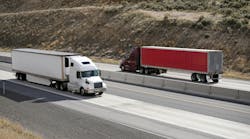With 40 years of experience in hauling hogs that are raised on farms in Alberta, Canada, Hoffman Trucking has developed an expertise in the livestock transportation business and understands the special requirements of its squealing cargo. Keeping the pigs safe and comfortable on long journeys has become even more critical since the company began crossing international borders two years ago when the founder's son, Pat Hoffman, took over the business and incorporated it.
“Hoffman Trucking originally hauled hogs strictly within Alberta, but we've expanded farther west in Canada and into the South and Northwest U.S. We do runs to California quite frequently, and we also take hogs to Texas and Florida for export to neighboring countries,” Hoffman explains. “Currently, we're moving 7,500 head of hogs a week.”
Fourteen lease-operators are employed by Hoffman Trucking to transport its livestock, which is moved in 53-ft. aluminum cattle trailers built by Merritt Equipment and specially outfitted for hog transport. To regulate the environment inside the trailer, Hoffman notes, the units are spec'd with Merritt's Coroplas package. “A series of plastic vented panels down the sides of the trailer can be moved up and down to control the amount of air flow according to weather conditions and temperature inside the trailer,” he explains.
“These Coroplas panels are essential on our longer hauls. During the winter, it can be 20 degrees in Alberta when a driver sets out, and 85 degrees by the time he reaches Texas. Some of the panels can even be closed up completely, which enables us to carry certain types of dry freight on backhauls.”
Hoffman Trucking owns 19 of these cattle trailers, 17 of which are tri-axle configurations. Since hog transporters get paid by the head, shaving weight off the trailer to maximize gross pay weight is an important issue. Hoffman says spec'ing aluminum wheels on his trailers saves a good deal of weight, especially on the tridems.
Gross weight becomes an even greater issue when hauling the hogs across the U.S. border. “In Canada we can haul 101,000 lb. gross weight whereas the legal maximum in the U.S. is 90,000 lb.,” Hoffman advises. “We have one super-truck with an extra axle, however, that allows us to carry up to 99,000 lb. in the states.
“We get approximately 250 hogs to a load in Canada,” he adds. “Problems occur when one or more of those hogs weighs more than estimated. The hogs are raised in an essentially disease-free environment on the farms. Because of health issues, once they go onto the trailer they cannot come off again until they reach the slaughterhouse.”
To maximize pay weight while ensuring loads don't go over the legal limit, Hoffman drivers used to underestimate cargo weight to allow for error. Trips were made back and forth between the farms and the nearest town to weigh the load, with hogs added cautiously until the maximum weight was reached.
“For the last two years, however, we've been using Air-Weigh onboard scales to weigh the pigs while loading. The scales have proved very valuable to us both in maximizing gross pay weight and avoiding the problems and fines resulting from overweight loads,” says Hoffman. “They are also extremely accurate. We routinely weigh within 300 lb. of a government certified scale.”
To work for Hoffman Trucking, drivers must have experience in hauling livestock and understand the special care they require. The trailers are equipped with sprayers inside that can be hooked up to a regular garden hose when the animals need to be sprayed down, and drivers are responsible for their welfare and comfort en-route.
“Drivers are also responsible for the maintenance of their own trucks, although we keep the records for them. Minimizing breakdowns is very important with livestock aboard, so we insist our lease-operators run equipment that is no older than four years,” Hoffman explains. “Livestock hauling is a very competitive business, but with experienced drivers and the right equipment specs we've been very successful.”


